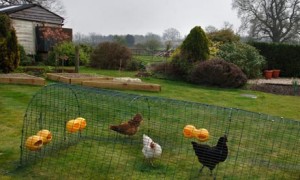A determined generation of young smallholders hope to reclaim the British countryside from the grip of corporate food giants
Sunday 16 June 2013
Smallholdings should be the dominant face of farming in Britain, says the Land Workers’ Alliance. Photograph: Alamy
The English peasantry may have officially died out in the Middle Ages, but a new breed of small-scale farmers who live off a few acres and celebrate life on the land have been accepted to join the world’s biggest peasant organisation.
Jyoti Fernandes and other members of the newly formed Land Workers’ Alliance were in Jakarta, Indonesia, last week for a global meeting of La Via Campesina, a movement of more than 180 peasant organisations which together can boast 200 million members in more than 80 countries. The alliance is the movement’s first membership organisation in England and Wales.
Fernandes, 39, is part of a wave of self-proclaimed English “peasants” determined to stand up for smallholders and reclaim the countryside with an alternative vision of what the future of UK agriculture could look like. “Food and farming aren’t just about market economics and just getting people calories in their body; it’s got this huge social and cultural dimension to it,” she says.
Western definitions of “peasant” are mostly pejorative, suggesting “a member of a class of low social status that depends on agricultural labour as a means of subsistence”. But many of the 70 people who set up the alliance in March are young, highly educated and committed to a life on the land. They expect membership to grow to several thousand.
Fernandes and her husband live at Fivepenny Farm, a highly productive 20-acre Dorset smallholding, producing vegetables, herbs, meat, eggs and cheese and generating its own electricity from small wind turbines and a set of solar panels. They sell directly to consumers at the weekly market in nearby Bridport.
“People have to be pretty creative to move to the land,” says Fernandes, who has long campaigned to change planning laws so that making a living off the land is easier. “People who have a lot of money and want to live in the countryside with a farmhouse can outcompete at an auction any day people who want to do a land-based farming industry. The countryside isn’t just this picture-perfect place for people to go and retire to. It needs to be a living, working countryside.”
So what do small farmers in south-west England have in common with peasant farmers in Africa or India? Fernandes says the lives of her counterparts in poor countries are similar to hers: “They say, ‘Oh, you’re a farmer too, so what do you have?’ and I say, ‘Well, I’ve got two cows and I milk them every day, and I’ve got chickens,’ and they say, ‘Oh, I’ve got cows as well,’ and we talk about that and who is looking after the cows while you’re away. The practical realities of life are pretty much the same – you get up in the morning, you milk the cows, you have to do something with your milk,”
“Farming has caught the imagination of a new generation of young people who are particularly politically aware,” says Ed Hamer, who has a small market garden in Chagford, Devon. “Growing food is a very positive reaction to what many see as problems of globalisation. One objective is to address the lack of representation of small farmers here in the UK.”
Simon Fairlie, a smallholder and editor of the Land magazine, adds: “There hasn’t really been an effective organisation in Britain representing small farmers – and there is a need for it. Agricultural extension facilities were abolished under Thatcher, and today there’s no acknowledgement in government that there are people doing this and that they could use support. Large-scale farming can produce the food, but so can small-scale farming, but with less machinery and more human interaction. And there are people who want that lifestyle.”
As members of La Via Campesina (literally “the peasants’ way”), people in the new alliance share the idea of “food sovereignty”, which insists on the right of people to produce for themselves and their communities and rejects corporate control of the food system. They say this has growing resonance in the UK, where less than 1% of people work on the land but increasing numbers of young people say they want to farm. “It might be for political reasons, or it might just be that they don’t want to sit behind a computer all day. It might be people who were disenfranchised in school. Whatever it is, they’re going into agriculture because they believe in it,” says Fernandes. “Food is really becoming an issue at the front of public consciousness.
“I think people are really realising what we lose when we lose a good, healthy food culture. And instead of constantly fighting a system that’s bad, we want to create positive alternatives … How can we take the right steps so that in 50 or 60 years we have enough people [in Britain] engaged in agriculture with enough skills and enough access to land and resources to be able to provide the food we need? We want to show that smallholdings can be productive.”
Patrick Mulvany, chairman of the UK Food Group, says the alliance may serve as a “lightning rod” for growers, gardeners, small farmers and others looking for alternative food systems in England and Wales (the Scottish Crofting Federation is already a member of La Via Campesina).
“To have a group in England is wonderful. At the moment, the [farming] debate is dominated by NGOs and policy wonks. These people, instead, are spending most of their time growing,” he says.

